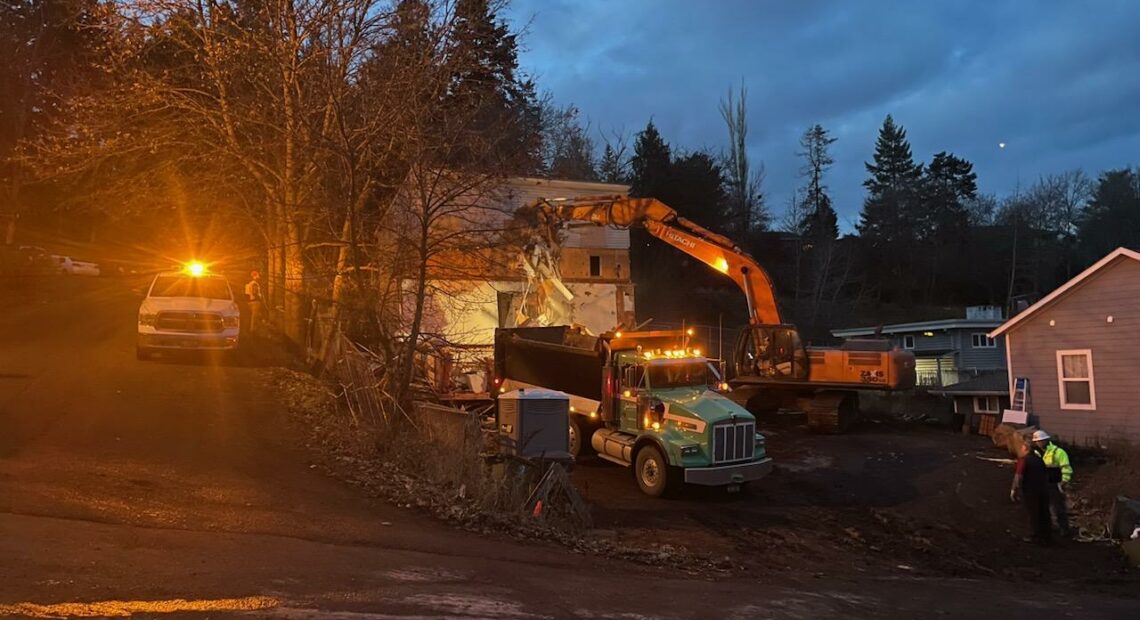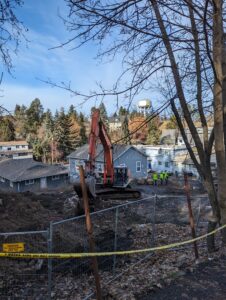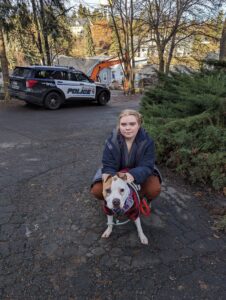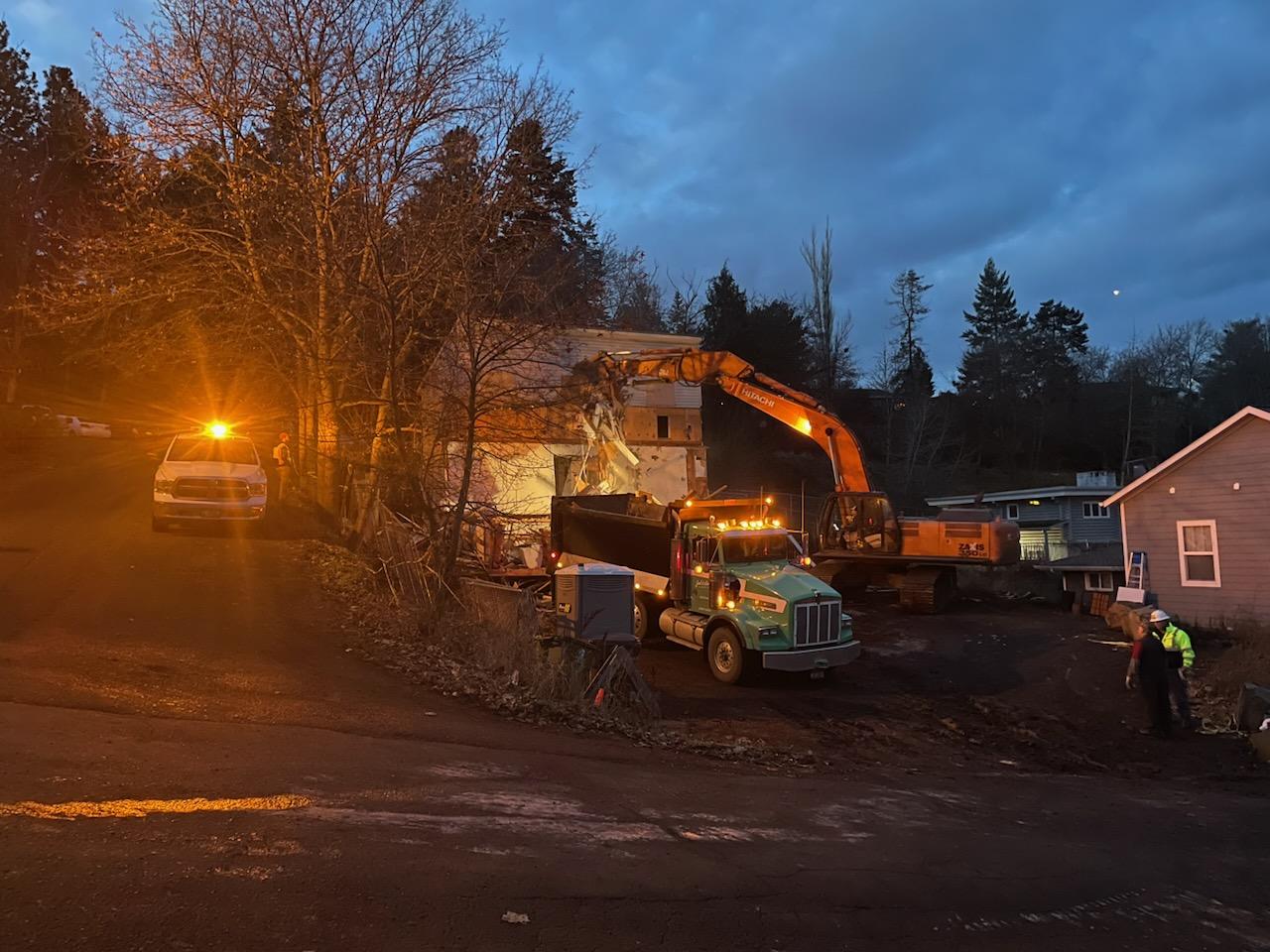
King Road House, where four University of Idaho students were killed last fall, has been demolished
Listen
(Runtime 1:03)
Read
The house where four University of Idaho students were killed last November has been reduced to rubble.
Heather Tetwiler lives right across the street. She’s hopeful the teardown of the home will allow students and locals who live nearby to get back to their lives, instead of constantly being hounded by national reporters and social media personalities visiting the spot where four young people were stabbed to death.
“For students, knowing that people come here and look at the building just for fun has been a really hurtful process for them,” said Tetwiler. “They’ve just been trying to get back some normalcy in their lives.”
Tetwiler remembers the chaos that followed for the neighborhood after the attack. She left for work early on November 13 but heard about the killings within a few hours. Her twin sister lived in a sorority on campus.
“I almost got stuck from all the reporters and the police officers coming in when I came home from work,” said Tetwiler, who said she sometimes had to wait for more than a dozen reporters to get out of the road to get in and out of her apartment parking lot as the days went on. “There were tons of media cars, tons of news people trying to get as close as they can to the house as possible and get their segment.”
In the weeks and months that followed, reporters from across the country went to extreme lengths to get interviews with students and locals living nearby, at one point setting up tents at the neighborhood dumpsters, said Tetwiler. “My boyfriend was chased around our parking lot by a reporter literally begging for an interview.”
After doing an on-camera interview, Tetwiler said she and her boyfriend ended up in the video of a TikTok sleuth accusing her and her boyfriend of being “creepy” and potentially being connected to the crime.
“It was really hard for me,” Tetwiler said. “I work at a hair salon and I was worried about losing my job because people were accusing me of something I didn’t do.”
Known as the King Road House, the property where the students were killed was given to the University of Idaho by the owner.
“It has been the plan of the university from the time of acquiring the property to tear it down,” said Jodi Walker, executive director of communications for the University of Idaho.

The University of Idaho owns the property. Jodi Walker, executive director of communications for the university, said there are no plans yet for the vacant lot. (Credit: Lauren Paterson / NWPB)
Removing the property is a way to help students who live in the area heal and move forward, said Walker.
Despite pushback to halt the demolition, it is normal for a crime scene to be destroyed before trial, said Andrea Burkhart, a criminal defense attorney in Washington state.
While the scene itself might contain evidence such as DNA or footprints, the house itself is not considered evidence in court, said Burkhart.
“On rare occasions, juries may be allowed to view a crime scene that is still intact but if the scene is in a materially different condition than it was at the time of the crime, then jury views are typically not allowed because they may be misleading,” said Burkhart.
Once the parties have had the opportunity to conduct any necessary testing and document the crime scene, there is little value to keeping the property, said Burkhart.
After the last of the victims’ items were removed this fall, the FBI was on scene last month to get photographs and scans of the house to create visuals for the upcoming trial, though a trial date has not yet been set.
Both the prosecution and the defense are in agreement that the house can be demolished, said Burkhart.
“This decision would not be made without input from investigators and evidence technicians,” said Burkhart.
Now that the house has been leveled, Tetwiler said she is relieved. She said she is hopeful the removal of the home will allow people in the neighborhood to get back to their lives.

Heather Tetwiler walks her dog Hemi Rue outside her apartment complex across from the King Road House. She’s hopeful the neighborhood will be more peaceful now that the house is gone. (Credit: Lauren Paterson / NWPB)
“It’s a healing step, because it’s no longer this tourist attraction for people to come to, they can be students again, they can walk to their homes and apartments again,” said Tetwiler.
The university is planning a Vandal Healing Garden and Memorial in remembrance of all people who have died while students of the school. There will also be a special memorial dedicated to victims Ethan Chapin, Xana Kernodle, Kaylee Goncalves, and Madison Mogen as part of the garden.
Students from the university’s Art and Architecture program, many of whom knew the victims, are helping with the design.
“With that house gone, as a symbol of something so horrible, what the university is going to do is going to be beautiful and healing for those families and students,” said Tetwiler.
As Tetwiler walked her dog near where the King Road House once stood and watched the clouds of dust rise from the last bits of house rubble loaded into the truck, she said she moved to Moscow because her sisters were here, and loves that the town is centered around students and families.
“It’s a beautiful community. We can come back, and we have the power to overcome this horrible tragedy. We will all heal in our own ways,” said Tetwiler. “What happened here doesn’t define us.”
















